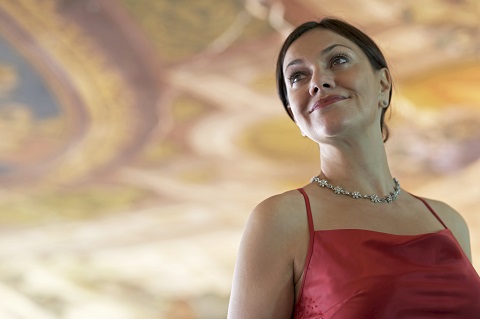Invernizzi and her instrumental partners - lutenists Craig Marchitelli and
Franco Pavan, and viola da gamba player Rodney Prada - began with two solo
madrigals by Caccini. It took a little time for the musicians to settle,
the sparse lute textures of the opening of ‘Dolcissimo sospiro’ (Most
gentle sigh) providing only the mildest anchor for the voice, while the
piquant chromaticism freed the vocal line still further. But, Invernizzi
did not compromise the purity of her tone, floating dreamily. The entry of
the viola da gamba underpinned the tangibility of the ‘sweet pain’ and
drama accrued at the close, with a sudden injection of fleetness at the
protagonist’s self-chastisement for futilely addressing a rambling sigh
that would surely fly off to another’s heart - ‘Ad un sospiro errante/ Che
forse vola in sen ad altro amante’.
All the qualities that would make this such an enthralling recital were
present in this song. Invernizzi contrasted a ‘clean’, sincere sound,
employing little vibrato, with richer colours, rippling through a musical
or textual gesture to indicate a surge of anger or pain. Dynamic contrasts
were similarly emotive and enhanced by vocal exclamations. Ornamentation
was restrained, ensuring the listener’s engagement with the text, but the
decoration of sustained notes was beautiful, and complemented by virtuosic
diminutions and gestural flourishes in the accompanying parts. Most
notable, though, was Invernizzi’s phrasing. She was responsive to the
harmonic insinuations, bringing musical phrase, text and chromatic nuance
together in a flexible line, often ‘bending’ the pitch towards a particular
note or syllable and so blending the pain and pleasure which are the
essence of these songs.
Caccini’s strophic dance ‘Dalla porta d’Oriente’ (From the gateway to the
East) tripped along freely, until an affective rallentando at the close
conveyed the suffering of the dawn sky, whose colorific splendour is paled
by the fire of rubies that burns in two lovers’ hearts, an extravagant lute
flourish sharpening the bitter tears which infuse the ‘roseo manto’ (rosy
mantle).
It was good to hear some rarer songs too. Tarquinio Merula’s ‘Folle è ben
che si crede’ (He is indeed mad, the man who believes’ was a droll
protestation of fidelity, the final repetition of the stanzas’ indifferent
refrain - ‘Dica chi vuole,/ dica chi sa’ (Let them speak who want to,/ let
them speak who know’ - thrown away with an insouciant wry shrug. Luigi
Rossi’s ‘La bella più bella’ (The most wondrous beauty) sparkled with the
flightiness of the woman who vanishes abruptly from a sleeper’s dream,
before the wriggling vocal line revealed his self-indulgent revelling in
the piercing pains of love. The winding vocal line of Sigismondo d’India’s
‘Intenerite voi, lagrime mie’ (Move to pity, my tears) fired chromatic
darts of pain, twisting and burning; the composer’s ‘Crud’Amarilli’ (Cruel
Amarilli) was more pensive, submitting in crushed resignation in the final
two lines, ‘Poi che col dir t’offendo,/ I’ mi morrò tacendo’ (and by saying
this I offend you,/to my death silent will I go’).
The music of Monteverdi was the heart of the recital. ‘Ecco di dolci raggi
il sol armato’ (See the sun armed with gentle rays) was a drama of fire and
ice, the arioso fluid and seemingly spontaneous. A lovely bloom was
followed by the soft diminishment of the voice at the close of ‘Si dolce
è’l tormento’ (So sweet is the pain) to convey first the ardent lover’s
unrequited passion, then his bitter resignation: ‘Ben fi ache
dolente/Pentita e languente/Sospirami un dì’ (let her one day, repentant
and languishing, suffer and yearn for me) ‘Disprezzata regina’ from L’incorozanione di Poppea was gripping, as Invernizzi communicated
all the theatre of the rejected Ottavia’s emotional rollercoaster, in
which, vulnerable and confused, she grieves for lost love (‘Dove, ohimè,
dover sei’; hurls her anger at her evil deserter, ‘empio Nerone’; and
imagines her tears reflecting her husband’s sensuous delights mingled with
her own distress, the slippery chromatic line culminating in a delicious
slow trill.
Woven between the vocal items were instrumental toccatas and passacaglias.
In a passacaglia by Giovanni Kapsberger, the contrasting musical characters
of the two lutenists made for an engaging duet discourse, as Marchitelli,
more extrovert, leaned over his chitarrone towards Pavan, as the initial
mood of gentle intimation and mystery became invigored with stronger
animation and definition. Kaspberger’s Toccata Arpeggiata (from Libro I d’intavolatura di chitarrone) was rhythmically playful and
impulsive, retreating to a whispered pianissimo and then, just when the
threads of sound seemed about to disappear, propulsively swelling once
more. Rodney Prada roved across the full range of his viola da gamba in
Orazio Bassani’s Tocatta per B Quadro, producing a full, juicy bass tone,
while in a Canzone by Giralomo Frescobaldi an engaging discourse ensued
between the sweet, decorative melody of the viola da gamba and the
vigorously brushed chords of the lutenists.
Invernizzi returned to Caccini at the close, offering one of the best-known
madrigals of the period, the composer’s ‘Amarilli, mia bella’, as her
encore. Once again, one marvelled at her declamatory technique and style,
which gave such life to the fictional poet-singer that one could believe he
was indeed present in Wigmore Hall.
Claire Seymour
Roberta Invernizzi (soprano), Rodney Prada (viola da gamba), Craig
Marchitelli (lute), Franco Pavan (lute)
Caccini - ‘Dolcissimo sospiro’, ‘Dalla porta d’oriente’; Kapsberger -
Passacaglia; Monteverdi - ‘Ecco di dolci raggi il sol armato’, ‘Disprezzata
Regina’ (from L’incoronazione di Poppea); Bassani - Toccata per B
Quadro; Frescobaldi - Canzone a basso solo; Merula - ‘Folle è ben che si
crede’; Rossi - ‘La bella più bella’; Kapsberger - Toccata Arpeggiata from Libro I d’intavolatura di chitarrone; d’India - ‘Intenerite voi,
lagrime mie’, ‘Cruda Amarilli’; Monteverdi - ‘Sí dolce è’l tormento’,
‘Voglio di vita uscir’.
Wigmore Hall, London; Monday 19th November 2018.
